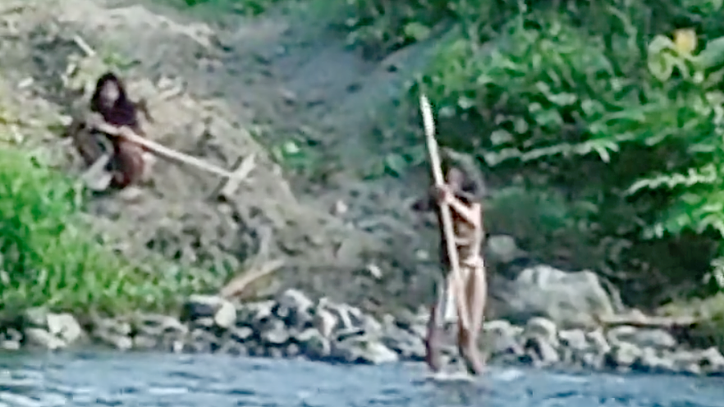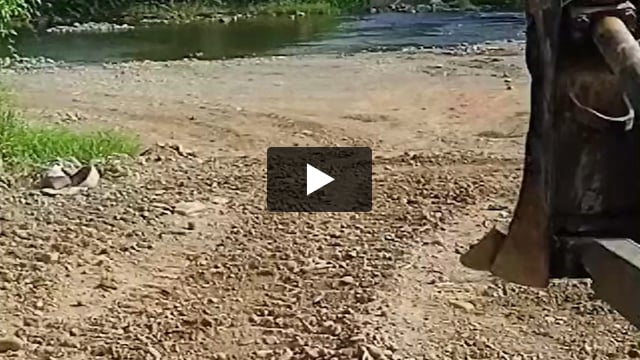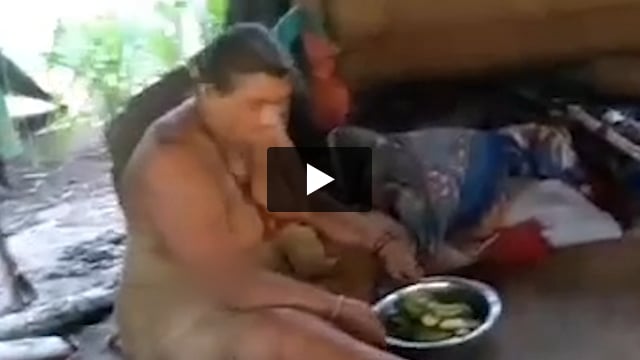The uncontacted people being sacrificed for electric car batteries
The Hongana Manyawa are running out of rainforest and running out of time. They desperately need international support to stop the destruction of their rainforest home, which is being destroyed by nickel mining for electric car batteries.
Rainforest guardians
The Hongana Manyawa – whose name means ‘People of the Forest’ in their own language – are one of the last nomadic hunter gatherer peoples in Indonesia. Out of a total population of some 3,500 people, around 500 of them are uncontacted and refuse interactions with outsiders.
The rainforest is the Hongana Manyawa’s home, from birth to death. It is the source of everything they need to survive and thrive; and it holds profound social and spiritual significance, revered as the source of life, Manga Wowango. Hongana Manyawa children are born in rivers; and their family plant a tree in gratitude and bury the umbilical cord beneath it. After a life dependent on the rainforest for food and shelter, their bodies are placed in the trees in a sacred area of the rainforest that is reserved for spirits.
All of this - their home, their means of survival, and their sacred spaces - are now being put at risk by the mining companies that are already starting to tear up their land.
Read the comprehensive report here.
This assault on their land is wholly in opposition to how the Hongana Manyawa look after and guard the living world around them. They provide for themselves entirely from the rainforest and their way of life is nomadic; setting up home in one part of the rainforest before moving on and allowing it to regenerate. The Hongana Manyawa are egalitarian, with no formal leadership; and both women and men often hunt together. They have unrivalled expertise in the Halmahera rainforest, hunting wild boar, deer and other animals, but never piglets or pregnant sows. They believe that the trees possess souls and feelings, and do not cut them down even to make houses, instead making small camps from sticks and leaves. When gathering plants for food and medicine, they perform rituals to ask permission from the plants, and leave offerings out of respect. But now outsiders are bringing bulldozers and excavators, destroying everything the Hongana Manyawa need and value.
Avoiding contact to stay alive
As with uncontacted peoples the world over, forced contact has been disastrous for the Hongana Manyawa. Between the 1970s and 1990s, many Hongana Manyawa were forcibly contacted, evicted from the rainforest and taken to new villages by the government and missionaries. This immediately exposed them to terrible outbreaks of diseases to which the Hongana Manyawa had no immunity and which they still refer to as “the plague”. In a two-month period, in one village alone, it is estimated that between 50 and 60 people died, almost one person every day.
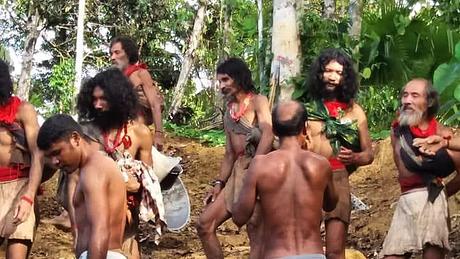 © Anon
© Anon
The uncontacted Hongana Manyawa have made it clear – time and time again – that they do not want to be contacted, to settle or have outsiders come into their rainforest. They are very much aware of the dangers which forced contact brings. As with the uncontacted Sentinelese people of India, it is little wonder that they have been known to defend their lands by shooting arrows at those who force their way in.
But now the Hongana Manyawa face another existential threat. Corporations are devouring their rainforest as they rush to provide a supposedly sustainable and environmentally friendly lifestyle to people thousands of miles away.
'Green' mining threatens uncontacted people
It is a cruel irony that the greatest threat to the Hongana Manyawa today comes from a so-called ‘green’ industry. Their rainforest sits on land rich in nickel, a metal increasingly sought after as an ingredient in the manufacture of electric car batteries – even though it’s not an essential component. Indonesia is now the world’s largest producer of nickel, and Halmahera is estimated to contain some of the world’s largest unexploited nickel reserves. But the nickel market is booming and mining companies are tearing up huge swathes of the rainforest that gives the Hongana Manyawa life.
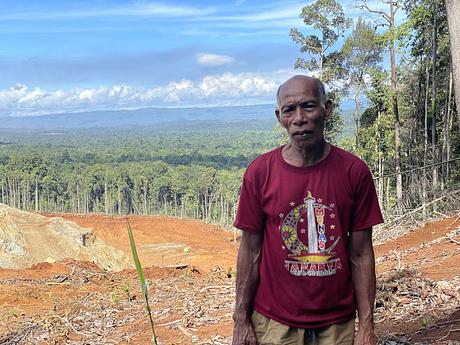
The uncontacted Hongana Manyawa are on the run. Without their rainforest, they will not survive. These cars are marketed as eco-friendly alternatives to fossil fuel-powered ones, but there is nothing eco-friendly about the way nickel is being mined in Halmahera.
Uncontacted peoples cannot give their Free, Prior and Informed Consent to the exploitation of their land or resources – required under international law for all ‘developments’ on Indigenous territories Yet there are now mining concessions all over Halmahera, including in the territories of the uncontacted Hongana Manyawa. Weda Bay Nickel (WBN) – a company partly owned by French mining company Eramet – has by far the largest mining concession on the island, and more than three-quarters of that concession overlaps with the territories of uncontacted Hongana Manyawa people. WBN began mining in 2019 and now operates the largest nickel mine in the world – four times the size of Paris! Huge areas of the Hongana Manyawa people’s home – their rainforest – have already been destroyed.
Eramet claims that it “sets the standard” and that it is “a benchmark company” when it comes to human rights. However, leaked reports show that since at least 2013 the company has known there are uncontacted Hongana Manyawa in their concession. Yet they continue to mine on their territory regardless.
German chemical giant BASF had planned to partner with Eramet in a $2.6 billion deal to process nickel for electric car batteries, but following intense lobbying by Survival – and our supporters who sent tens of thousands of emails – BASF pulled out of the deal. However, Eramet continues to rip up the rainforest, plans to ramp up the mining exponentially and to operate for many more decades.
The Indonesian government claims that nickel mining is “critical for clean energy technologies” yet the nickel is being processed almost entirely through coal-fired power stations. Between 2020 and 2023, cases of acute respiratory tract infections grew by over 2300% in villages near the nickel refineries. Survival is fighting against other false solutions to the climate crisis, which are destroying Indigenous lands and lives. 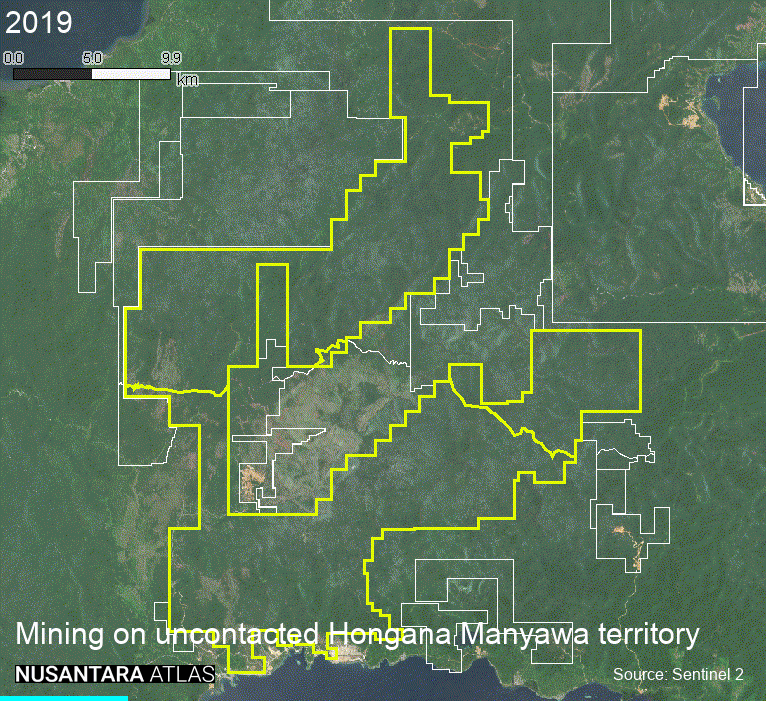
These satellite images from Nusantara Atlas show the rapid development of mining on uncontacted Hongana Manyawa territories. Weda Bay Nickel’s concession is in yellow and other mining concessions are in white. If this continues, the Hongana Manyawa's rainforest will soon be gone.
Watch this interview with two Hongana Manyawa people, decrying the destruction of their rainforest and stating plainly that they do not give consent for mining companies to take their land:
Electric car companies must take a stand
The Indonesian government is keen to attract international nickel buyers and has been desperate to court Tesla and other electric car companies – at one point even offering Tesla their own ‘nickel mining concession.’
Survival supporters sent over 20,000 emails to Tesla, calling for the company not to buy nickel from Halmahera but to push instead for a no-go zone to protect the uncontacted Hongana Manyawa. Following such pressure, in May 2024, Tesla announced that they were exploring the need for the establishment ‘of a no-go zone for mining to protect indigenous and human rights, particularly those of uncontacted communities.’
This is a big step forward, however more needs to be done. Many vehicle companies already have significant links to the Indonesian nickel industry and Volkswagen and Stellantis have even signed MoU’s with Eramet and other companies which operate in Halmahera. Unless urgent action is taken, it’s highly likely that nickel from the Hongana Manyawa’s rainforest will end up in their batteries.
They cannot claim ignorance. Survival has reached out to electric vehicle companies and had discussions with many of them. The time for action is now. Survival calls upon all electric vehicle makers to pledge not to take materials from the territories of the uncontacted Hongana Manyawa, and to use their influence on the Indonesian government and the mining and processing companies to push for a no-go zone.
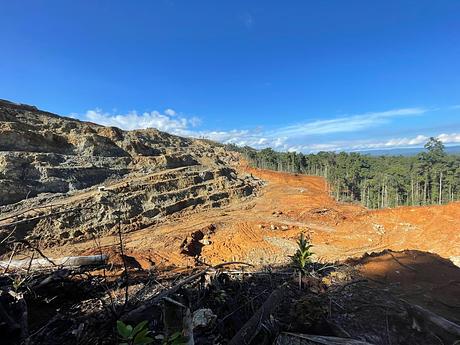
Around the world, Survival has successfully campaigned for the rights of uncontacted peoples, opposing intrusion from outsiders who bring deadly diseases and devastating development projects which could wipe them out. Rather than destroying yet more of the living world, and the people who defend it, to fight climate change, we should support Indigenous peoples to defend their rainforests and their land rights. They are the guardians of the green lungs of the planet.
Take Urgent Action for the Hongana Manyawa
The situation is urgent and if they are to survive, the Hongana Manyawa's land rights must be recognized. A no-go zone must be created to protect those who are uncontacted from total destruction.
Since Survival’s campaign launched in April 2023, we have made huge strides in pressuring the Indonesian government, electric car companies and the mining and processing companies themselves. There is hope for the survival of the Hongana Manyawa, but they need your help.
We are calling for:
- Eramet and the other companies mining in Halmahera to immediately abide by international law and stop mining and other developments on the territories of the uncontacted Hongana Manyawa.
- Electric vehicle companies to publicly commit that they will not buy nickel or cobalt from the territories of the uncontacted people.
- The Indonesian government to establish a “no-go zone” to protect the uncontacted Hongana Manyawa and their territories.
With your support, the home of the uncontacted Hongana Manyawa can be protected from mining so that they can live freely in their rainforest once more.
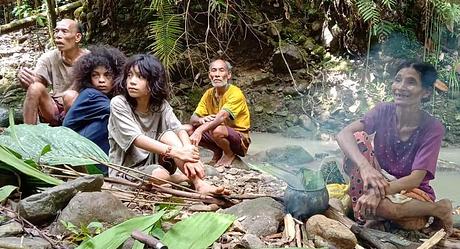 © AMAN
© AMAN
Join the mailing list
There are more than 476 million Indigenous people living in more than 90 countries around the world. To Indigenous peoples, land is life. Find out more about them and the struggles they’re facing: sign up to our mailing list for occasional updates.
News from The Hongana Manyawa
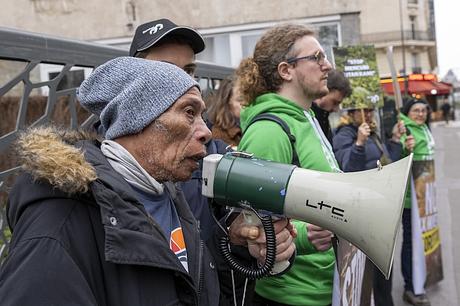
Indigenous protester tells French mining giant: “Stop the mining or my people will die.”
Indigenous man born uncontacted in the Indonesian rainforest has traveled to Europe to protest for his people's land.
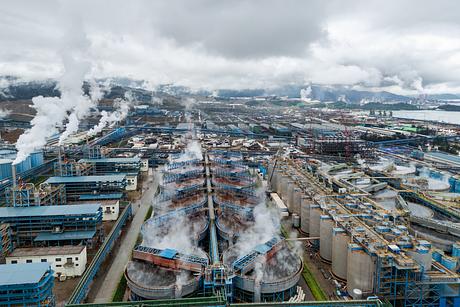
Indonesia: Presidential visit for new EV battery factory is “a disaster for uncontacted Indigenous people”
Indonesia plans for new $6-7bn EV battery factory on Halmahera Island spells disaster for the island’s uncontacted Indigenous people.
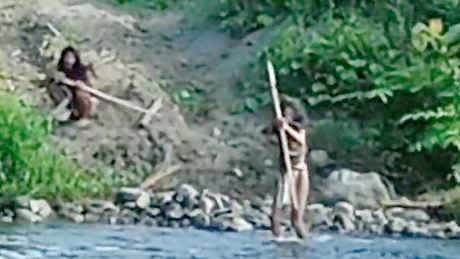
Demand for EVs drives destruction of uncontacted people: new report
A new report has revealed that demand for electric vehicles is destroying uncontacted people’s lives and lands in Indonesia.

Indonesia: German chemical giant BASF pulls out of major nickel project as uncontacted tribe’s fate hangs in the balance
BASF pulls out of $2.6bn nickel project, after campaigners highlighted the plight of uncontacted people in the area.

Indonesian Senate Leader: Protect uncontacted tribe from nickel mining
One of Indonesia's most senior politicians says the government should protect an uncontacted tribe from nickel mining.

Tesla highlights rights of uncontacted tribes in report – a “wake-up call” for businesses and governments
Tesla explores the need for the creation of no-go mining areas where uncontacted Indigenous people live.

